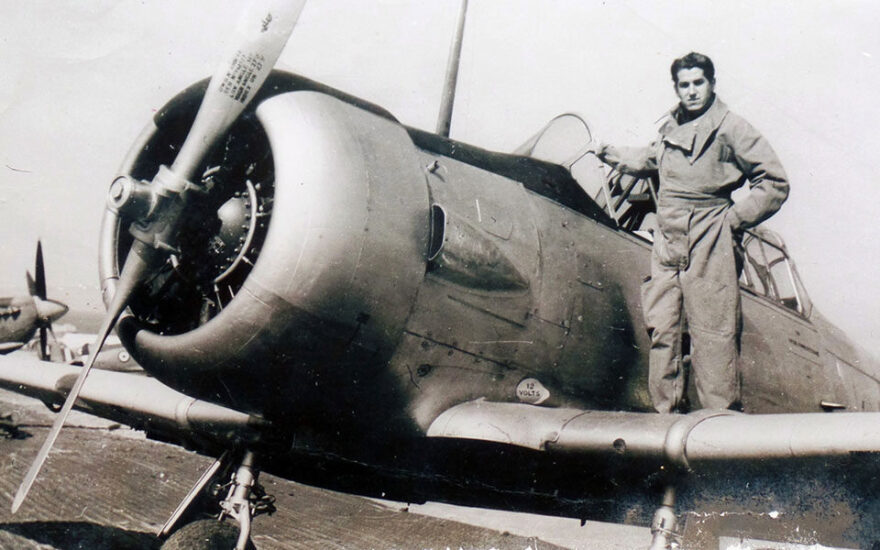
Stories Talk | Presentation Skills and Effective Storytelling
Stories Talk | Presentation Skills and Effective Storytelling
The legendary pilot who defended our country with all his might during WWII, rightly considered that it’s our duty "to not forget, to honor and to be vigilant".
By Mia Kollia
Translated by Alexandros Theodoropoulos
Air chief marshal Konstantinos Chatzilakos was born in Larissa in 1920. At the age of 20, he enrolled in the Hellenic Air Force Academy and during the Second World War, as a fighter pilot of the Hellenic Royal Air Force, he operated on the battlefields of North Africa, the Mediterranean, Italy, Yugoslavia and the Aegean, carrying out over 200 air combat missions. As a young Icarus then, as he himself has said, "everything started with Greece's "NO" to the Italian invasion and continued with the fulfillment of an oath and a debt; a journey full of stress, pain and blood. "Do-or-Die. So it happened".
During the Nazi invasion in Greece, Chatzilakos was in the Hellenic Air Force Academy in Argos, together with the other 39 Icarians (Hellenic Air Force Academy graduates), later in Egypt and then in Rhodesia and Sudan. There, he completed his training as a fighter pilot, before joining the Greek war squadrons of the Middle East, under the auspices of the British Royal Air Force. His desire was to fight as soon as possible.

Indeed, in February 1943, he joined the 336th Fighter Squadron, in the "Hurricane" aircrafts. He lived with his colleagues in a back tent in the Libyan desert and they flew out of makeshift airfields on the coast of North Africa and across the Mediterranean to protect allied convoys and operations in Nazi-occupied Crete.
In November 1943 he was in the cockpit of one of four Hurricanes that provided air cover for a cruiser sailing into Alexandria harbor carrying British Prime Minister Winston Churchill and two days later escorted an American bomber "Liberator", which carried US President Franklin Roosevelt to Tehran. Of course, these shipments were secret - "later we found out what their precious cargo was", he said.
In the autumn of 1944 they left North Africa and settled in bases in Italy. At that time, German troops hurriedly left the Balkans, as the war had moved to their own country. On October 12, 1944, Athens was liberated, but some were still fighting…
"The 12th of October 1944 was a day of joy for the Athenians, but I remember it as the day my colleague Epaminondas Kottas was killed, in a mission to Yugoslavia, while the Prime Minister of Greece was raising the Greek flag on the Acropolis. The war in Europe continued after October 12th. After the missions we did in the Aegean, six more of my colleagues were killed until the last German garrisons surrendered. Lefteris Karamalegos and I returned to Italy, where the fighting continued fiercely and we joined an English pursuit squadron, until the end of war in Europe, on May 8, 1945", he said.
He never forgot those who fought by his side, in the most adverse conditions, no matter how many years had passed since then. In an interview, he said: "You never forget your comrade-in-arms. And especially the one with whom you shared your tent and in the evening, after returning from a mission, he just wasn’t there.
In the period 1945-1967, Konstantinos Chatzilakos served as instructor in military schools of the Armed Forces, as well as commander of large air units and head of operations in NATO headquarters.
He retired in April 1967, being loyal to the Constitution, because of his opposition to the military junta of colonels. So he worked for nine years as a manager in Halyvourgiki. In 1978-1997 he worked as a technical consultant for Mc Donnell Douglas Corporation while in 2006 he became the inventor of "TRITON", the Greek Wave Energy to Electricity Converter. As a veteran fighter pilot, he served as president of the British Royal Air Force Veterans Association, in the branch in Athens.
In June 2021, the Hellenic Air Force celebrated the return to Greece of the iconic aircraft of the Second World War, the anniversary Spitfire MJ755, which was completely rebuilt in the United Kingdom. At the event, Mr. Chatzilakos spoke flooded by emotion: "I have made three forced landings with a Spitfire and all three times I preferred to try my luck in the cockpit rather than abandon the aircraft. At the first two times I was lucky, but on the third time, I was injured and the Spitfire was destroyed. I used to call them "my loyal friends". Now, appearing almost 70 years after a Greek Spitfire in the Attic sky, it brings to my memory happy and difficult times. Today, at the age of 101, all I can do is dream that, at some point, I will fly in it again."
Konstantinos Chatzilakos passed away at the age of 102, on November 29, 2022.
#HisStory